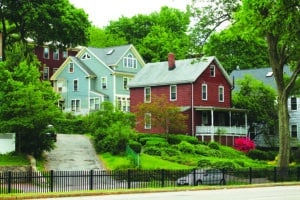
Younger buyers made up many of the buyers who supported Greater Boston’s urban condominium markets in 2020.
Ask Matt Czepiel who’s been buying condominiums in Greater Boston’s urban areas, amid a widely reported flight from cities, and he first questions the notion of a mass exodus.
He’s seen the media coverage and thinks that given the overall number of city dwellers who’ve traded in their T passes for fenced-in yards is “a little exaggerated for Boston,” Czepiel, a Realtor with Lamacchia Realty, said. Moreover, unfilled demand for urban condos before the pandemic was so great that even with some residents moving to the suburbs, “There’s still enough to swallow up the [additional] inventory that’s there.”
Boston’s urban condo market began 2020 robustly before the pandemic all but paused sales for several weeks as agents, buyers and sellers adjusted to new realities. As sales again picked up, many urbanites indeed left. That and other pandemic shifts like record-low interest rates combined to create a long-unseen uptick in condominium stocks, paving the way for a new cohort of urban property owners.
Inventory grew until the summer, when sales were strong.
“There were still plenty of bidding wars for a lot of places,” Czepiel said.
Then sales again lagged last fall and condo stock increased.
“Looking almost 10 years out, you didn’t see inventory levels like we were seeing in September and October,” Jon Ufland, managing broker at Unlimited Sotheby’s International Realty principal, said.
The year ended with median condo sale prices up between 3.5 and 12.9 percent from 2019 in the five counties that make up Greater Boston. The trends weren’t uniform across all neighborhoods, though. While sales in Jamaica Plain increased 37 percent (with prices jumping 9.16 percent), according to The Warren Group, publisher of Banker & Tradesman, most areas saw sales hold steady or decrease slightly. And overall, prices increased anywhere from 0.28 percent to 26.77 percent, the latter being Lawrence’s impressive jump.
Many Buyers Are Young
With the coronavirus disrupting the charms of urban life, buyers entered into a market with surplus inventory, and they did so in enough numbers to nudge prices back up. Who were they?
“We are currently seeing a lot of movement within the city,” Ufland said. “We are seeing renters who now can buy. People who were renting smaller places and can now buy a bigger place.”
By and large, they were young. And they bought even as rents dropped. In fact, some landlords decided to sell their rental condos, a trend Ufland saw in September and October as condo stock grew and rents fell in higher-end properties. It’s been an opportunity for first-time home buyers; with rents down, Boston became less appealing to investors, particularly international ones, said Sue Hawkes, managing director at The Collaborative Cos.
The urban shuffle didn’t stop there. Some residents who were living in buildings with elevators and other shared spaces decided they wanted something different during a public health crisis.
“If they had the money, they were trading for less dense product,” Hawkes said. “That might have been in Beacon Hill or Back Bay where they had perhaps a brownstone, or even in South Boston where there are single–families – places where there is more space, but fewer of them.”
Nonetheless, the number of condos for sale in Beacon Hill and Back Bay doubled over 2019; sales in Boston declined 12.74 percent, while South Boston condo sales dipped 6.55 percent.

Homes look out on the Arborway in Boston’s Jamaica Plain neighborhood. The area was a bright spot in the urban condominium market, with sales up 37 percent in 2020.
Old Trends, Accelerated
Many urban dwellers don’t want to live in the suburbs. The coronavirus didn’t convince them to leave, and those who did move to the suburbs were on the cusp of doing so anyway– a perennial cohort among young urbanites.
“That group has always, always been people who have children or who are about to have children,” Hawkes said, adding that “it was definitely expedited a little bit by COVID.”
Even as younger residents left cities, empty nesters, who would normally have been condo-shopping in Boston, Somerville or elsewhere, waited.
“They really hunkered down during this time,” Hawkes said. “If they had not sold their home, they were not choosing now to move back into the city.”
This partly explains the surplus of luxury condominiums, worth $2 million or more, and why those are selling more slowly than lower–priced homes.
“It’s probably got the highest percentage of new product coming online, which by virtue of percentage is going to mean that it’s probably overbuilt,” Hawkes said.
While it will take time for the luxury condo stock to return to a more typical level, Hawkes predicts that it will.
Energy Returned in Q4
Right now, that prediction seems spot on. Hawkes saw new energy and enthusiasm returning to the urban condo market after the elections in November, and January has clearly ushered in optimism, and with it, condo buying.
Czepiel is bullish on the spring market, with a caveat.
“I still think it’s going to be a seller’s market – as long as you price reasonably,” he said. “You can’t get as greedy, as I think people were the past few years, in terms of being aggressive with price.”
Low interest rates and government relief payments are helping, and Ufland, too, anticipates that inventory – still relatively high – will be absorbed quickly. But “if the economy has a problem, then all bets are off,” he added.
With vaccinations underway and the prospect of normalcy beckoning from later this year, even some empty nesters have tentatively turned their attention back to urban markets, and Hawkes is optimistic about 2021.
“We’ve sold more units in the last four weeks than we had probably sold in the previous four months on our projects,” she said. “By double, almost, if you include the rentals. So, the market is opening up. It’s feeling good. People are feeling positive.”
Czepiel is even more specific as he looks long term.
“Five years from now, I would expect the Boston condo market to be just as strong as it was pre-COVID,” he said.




 |
| 
